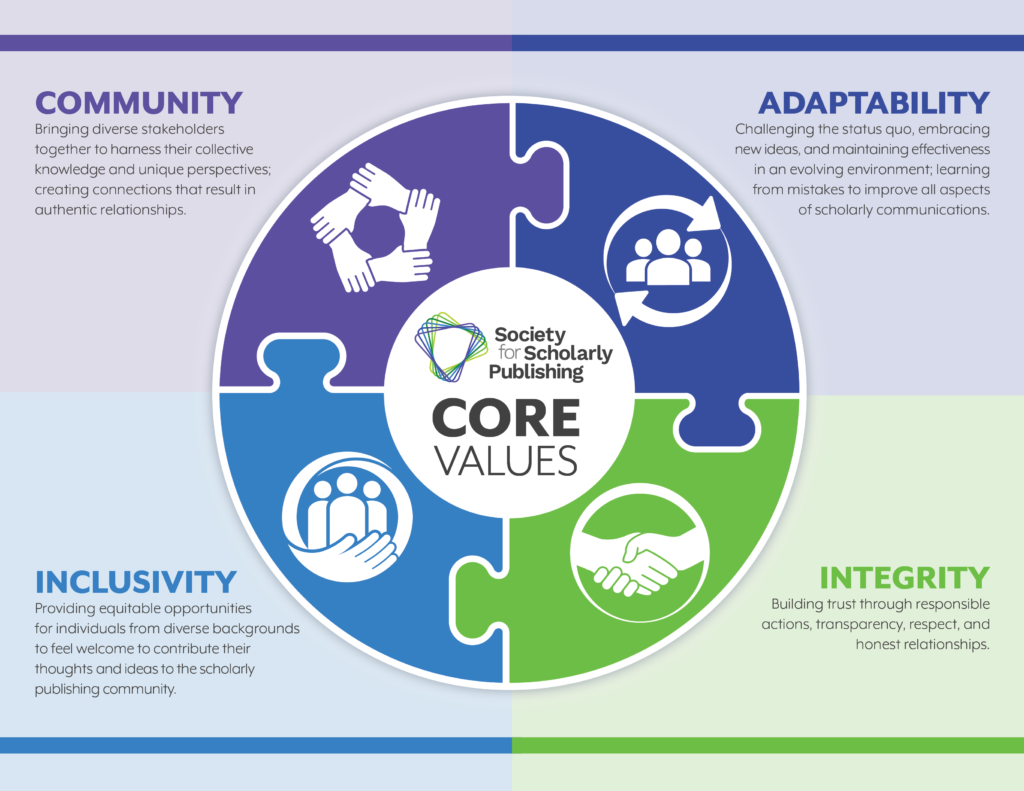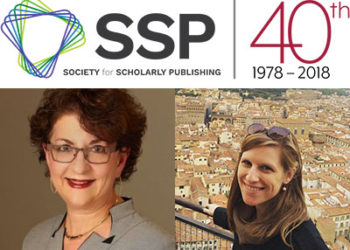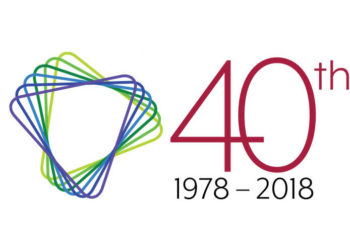Like most mission-driven organizations, values are very important to the Society for Scholarly Publishing (SSP). However, we have never actually articulated what those values are! So, when we decided that the Board should revisit our strategic goals last summer, I was also keen that we should take this opportunity to define our values and ensure that our goals align with them — now and in the future. The Board agreed, and Board members Randy Townsend of PLOS and Miranda Walker of Wolters Kluwer (President Elect) kindly volunteered to lead this work.
We’re now ready to share our values with the world. In this post — a conversation between Miranda, Randy, and me — we will share the process we used, the values themselves, how we plan to embed them in our work moving forward, and how you can get involved!

Miranda and Randy, why was this work important from your perspective?
Randy Townsend: The strength of SSP is really the individual commitment from members who share their time and talents with one another. Although we may have different motivators that bring us together, SSP, to my knowledge, has never specifically articulated the purpose that each of us hopes to experience from our involvement. When reflecting on the early days of my own service, I was hoping to connect with other professionals who were facing the same challenges in their publishing activities or asking the same questions that I was. I was trying to understand where I fit in, if I would be welcomed, or if my voice mattered. For me, this work reflects a step toward answering some of those questions for new members and new professionals entering our industry. In the coming years, I’m looking forward to seeing these values become formally integrated into the various SSP initiatives and events.
You came up with a great process for defining our values — one which, in many ways, reflects the values themselves! How did you decide on your approach, and who and what was involved?
Miranda Walker: I have to give you credit for that Alice. You challenged us to identify the core values, include as many members as we could in the process, and oh, have them ready to be reviewed and approved by the February board meeting, which was just a little over three months away. We started with reviewing other organizations’ values to get an idea of how we wanted ours to look — we looked at society values, business values, even sporting organizations’ values. We decided we needed five to seven single words that reflected what was important to our members and leave room for additional context if needed. That’s how we ended up playing a game. Using a free values exercise we found on a professional coaching website, we hosted a virtual game night and invited SSP Board Members and Committee Co-Chairs. I think we had a couple of dozen people on the Zoom. We then went through 49 cards with values ranging from adventure to work. We asked attendees to consider whether a presented value fit SSP. Throughout the game, we took notes on comments from the attendees on why they agreed or disagreed on a particular value. From there we ended up with nine values and corresponding descriptions.
For the next step, we reflected back on our original charge, which was to include as many members as we could in a timely fashion. We sent the proposed values as a survey to 250 SSP volunteers — Board members, Co-Chairs, and Committee members — and asked them to vote for their top five and also let us know if the descriptions fit. We left room for wording suggestions and comments. With a 24% response rate, we worked with Melanie to wordsmith the list to the four that were presented to the Board in February for approval. It was a fun exercise. During the process, many of the survey respondents shared what SSP membership has meant to them and it made the activity that much more rewarding.
I was really happy to see so much consensus among everyone involved in the process about our values. The four we agreed on — community, inclusivity, adaptability, and integrity — rose to the top at all stages of the process. In fact, community got 100% support throughout, which is a real testament to SSP’s strengths in this area. Were you surprised by anything about the process or the final values we chose?
Randy: The one thing that surprised me is that the prep work we did in advance of the actual voting was the hardest part. We had a great turnout for the virtual game night, every voice received attention, and it was fun to watch SSP leaders respectfully debate the differences between ethics and integrity and what each means for the broader SSP membership. We all recognized that we’re not a perfect organization, but when considering the SSP that we collectively envision, the harmony was unanimous. I honestly felt like SSP won at the end of the day.
I think the reason why it was a smooth and enjoyable process is that, in many ways, SSP is already living our values. We are a community-led organization that is committed to being diverse, equitable, inclusive, and accessible, and we can be proud of the fact that we’ve made a lot of progress in recent years, including currently having our most diverse Board ever. However, that doesn’t mean that there isn’t (always!) room for improvement. Miranda, as incoming President, now that we have an agreed set of values, what do you see as the main challenges and opportunities for embedding them in our future work?
Miranda: I see it as if SSP were a brick-and-mortar building. Before heading to The Scholarly Kitchen, the Annual Meeting, one of our amazing educational seminars, or sitting down to share a thought on C3 [our member engagement platform], visitors will be greeted and asked to look up to see the bold writing on the wall: Community, Inclusivity, Adaptability, and Integrity. These words will be a reminder that all who take part in our organization’s activities should trust that collective voices will be heard without bias; new ideas and opportunities will be challenged and embraced; and dialogue will be shared in a way that nurtures transparent, respectful, and honest relationships.
As incoming president, I’m on door duty 2022-2023. I will do everything in my power to greet those coming through and encourage other SSP volunteers to do the same. Together, we will share the values as often as we can in Board and Committee meetings and use them as a guiding force behind our projects and priorities.
Thank you both again so much for leading this work!
These values are really foundational to the decisions we make and the actions we take today and tomorrow, and we are now formalizing them in our strategic goals and our broader work. And, as a community-led organization, of course we also want to get our wider community involved. The SSP Board and staff have come up with some great ideas for recognizing and celebrating examples of our values in action. Some will be revealed at our upcoming Annual Meeting (registration is now open — early bird rates available through April 22!), and some are starting now, including a social media campaign! SSP and TSK invite community members to recognize the demonstration of these core values in real life when they see it by tagging either the Society for Scholarly Publishing or The Scholarly Kitchen on social and using the hashtags #Community, #Inclusivity, #Adaptability, #Integrity, or #CoreValues. Share our Core Values Statement or download the Core Values social graphic to post on your social media feeds to participate yourself and spread the word! If you have other ideas, please share them in the comments below — or contact SSP at info@sspnet.org.
SSP’s Values
- Community: Bringing diverse stakeholders together to harness their collective knowledge and unique perspectives; creating connections that result in authentic relationships
- Inclusivity: Providing equitable opportunities for individuals from diverse backgrounds to feel welcome to contribute their thoughts and ideas to the scholarly publishing community
- Adaptability: Challenging the status quo, embracing new ideas, and maintaining effectiveness in an evolving environment; learning from mistakes to improve all aspects of scholarly communications
- Integrity: Building trust through responsible actions, transparency, respect, and honest relationships
Discussion
1 Thought on "Community, Inclusivity, Adaptability, and Integrity "
Thank you and the others involved for your work on this! I’m looking forward to what comes next.



